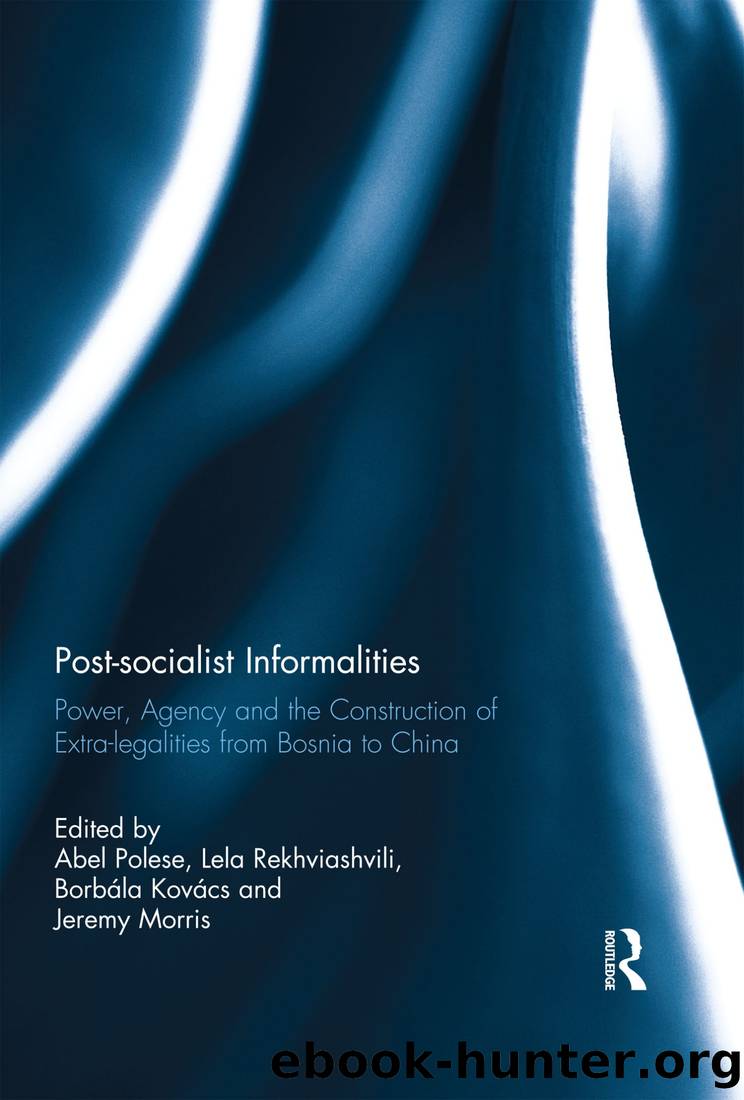Post-Socialist Informalities by unknow

Author:unknow
Language: eng
Format: epub
ISBN: 9780367321918
Google: mIxewwEACAAJ
Amazon: 0367321912
Goodreads: 44640503
Publisher: Routledge
Published: 2019-05-14T00:00:00+00:00
Gift exchange is one of the social games that cannot be played unless the players refuse to acknowledge the objective truth of the game, the very truth that objective analysis brings to light, and unless they are predisposed to contribute, with their efforts, their marks of care and attention, and their time, to the production of collective misrecognition. (Bourdieu 1990, 105â106)
Nevertheless, he also makes clear that participantsâ awareness of the objective logic of gift exchange is pre-reflexive, stemming from âdispositions,â that is âinternalised, embodied structuresâ (Bourdieu 2000, 193), and becoming effective only through an act of ârepressionâ (Bourdieu 2000, 192) that makes the nature of the practice recognizable in a way that defies reflection. It is this very pre-reflexive character of misrecognition that hinders its applicability to the field of informality. Ledeneva (2011, 729) talks about a strategic use of misrecognition to discount moral responsibility for involvement (âstrategies by which one can be involved in blat transactions while also misrecognizing doing soâ), whereas Bourdieu emphasizes misrecognition as a socially induced and culturally mediated failure to see things as what they actually are rather than as outright, purposeful deception.
For this reason, and taking into account the documented tendency of participants in informality deliberately to frame the nature and meanings of their actions in a way that is meant to preserve their sense of honour and respectability (Birdsall 2000, 157â161; Polese 2008; Williams and Onoshchenko 2014, 27), discounting any evidence to the contrary, I consider misrecognition too distant a concept to account properly for the social order governing informal practices. It seems more reasonable to affirm that participants in post-socialist informal practices and outsiders operate in a âmutual pretence awareness contextâ (Glaser and Strauss 1965), each of them being consciously aware of the nature and stakes of informal transactions, and knowing that the others know them as well, but keeping this knowledge unarticulated. This context is rendered possible by the widespread use of âpublic secrecyâ (Taussig 1999), that is the voluntary collective concealment of what is actually going on in informal transactions.2
Download
This site does not store any files on its server. We only index and link to content provided by other sites. Please contact the content providers to delete copyright contents if any and email us, we'll remove relevant links or contents immediately.
The Secret History by Donna Tartt(19088)
The Social Justice Warrior Handbook by Lisa De Pasquale(12190)
Thirteen Reasons Why by Jay Asher(8909)
This Is How You Lose Her by Junot Diaz(6886)
Weapons of Math Destruction by Cathy O'Neil(6279)
Zero to One by Peter Thiel(5802)
Beartown by Fredrik Backman(5754)
The Myth of the Strong Leader by Archie Brown(5507)
The Fire Next Time by James Baldwin(5444)
How Democracies Die by Steven Levitsky & Daniel Ziblatt(5218)
Promise Me, Dad by Joe Biden(5153)
Stone's Rules by Roger Stone(5088)
A Higher Loyalty: Truth, Lies, and Leadership by James Comey(4963)
100 Deadly Skills by Clint Emerson(4925)
Rise and Kill First by Ronen Bergman(4788)
Secrecy World by Jake Bernstein(4753)
The David Icke Guide to the Global Conspiracy (and how to end it) by David Icke(4718)
The Farm by Tom Rob Smith(4509)
The Doomsday Machine by Daniel Ellsberg(4490)
